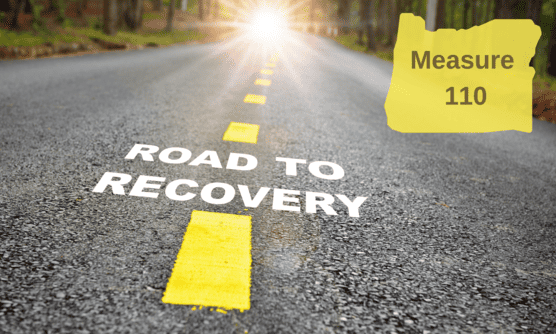National study concludes Measure 110 has not led to more overdose deaths
The Journal of the American Medical Association (JAMA) has published a study* finding Measure 110 has not contributed to alarming increases in overdose deaths in Oregon.
Measure 110, approved by more than 58% of voters in 2020, decriminalized possession of small amounts of drugs and provides a stronger treatment and recovery model. It went into effect Feb. 1, 2021.
The study compared overdose data in Oregon and Washington—two states that recently implemented laws that fully or partially decriminalized drug possession—to the remaining 48 states, all of which have experienced a rise in fatal overdose rates. Researchers looked at data for a one-year period following implementation of the new drug laws.
The findings state that Measure 110 in Oregon and drug possession decriminalization in Washington “were not associated with changes [increases] in fatal drug overdose rates in either state.”
Read more about Measure 110’s implementation here, and follow Oregon overdose trends here.
Mental health support available 24/7 to Oregon farmworkers
 Did you know the rate of suicide among farmers is 3.5 times higher than the national average?
Did you know the rate of suicide among farmers is 3.5 times higher than the national average?
This week we recognize World Mental Health Day (Oct. 10) and want to highlight Oregon’s new AgriStress Helpline—a free confidential crisis and mental health resource to support the state’s farmers, farm workers, ranchers, fisherman, foresters, and their families.
Oregon Department of Agriculture (ODA) launched the helpline last month in partnership with Oregon State University, making Oregon the seventh state in the country to offer a resource for agricultural and forestry communities. Other states with AgriStress Helplines include Connecticut, Missouri, Pennsylvania, Texas, Virginia and Wyoming. The toll-free number is the same everywhere, and you don’t need to live in Oregon or one of the participating states to call.
People can call the AgriStress Helpline when they are in a crisis, need resources, are concerned about a loved one or just need someone to talk to. Calls are answered within 30 seconds, and all callers are screened for suicidality and offered a 24-hour follow-up call.
The helpline’s crisis specialists understand the culture, values, stressors and lived experiences of agriculture, forestry and fishing workers. They can also offer local mental health resources specific to these industries.
The Oregon AgriStress Helpline is available 24/7. If you or someone you love is struggling, call or text (833) 987-2474. The phone line can be accessed in up to 160 languages with the help of interpreters, and the text line offers English, Spanish and Vietnamese.
Calling 988 continues to be a free mental health resource for all populations, 24/7. Check out blog for a diverse list of mental health resources.
Help rebuild Oregon’s behavioral health workforce
The pandemic profoundly impacted behavioral health professionals practicing in Oregon. To better understand the needs of behavioral health workers and how to recruit and retain the workforce, the state seeks applicants for a new workgroup. Recent state legislation created the workgroup, which will inform future recruitment and retention efforts. Applicants should work in behavioral health care and represent the geographic, racial, ethnic and gender diversity of Oregon.
The workgroup will develop recommendations to:
- Improve behavioral health workforce recruitment and retention.
- Reduce administrative burdens.
- Increase reimbursement and pay.
- Improve caseload management.
- Increase diversity within Oregon‘s behavioral health workforce.
- Address professional burnout.
The workgroup will meet from November 2023 through December 2025 and develop a report for the Legislature. Read the workgroup’s charter here. Applicants can apply online before Oct. 23 at 8 a.m. For more information, or to request an application in another language, email HB2235.Workgroup@oha.oregon.gov.


